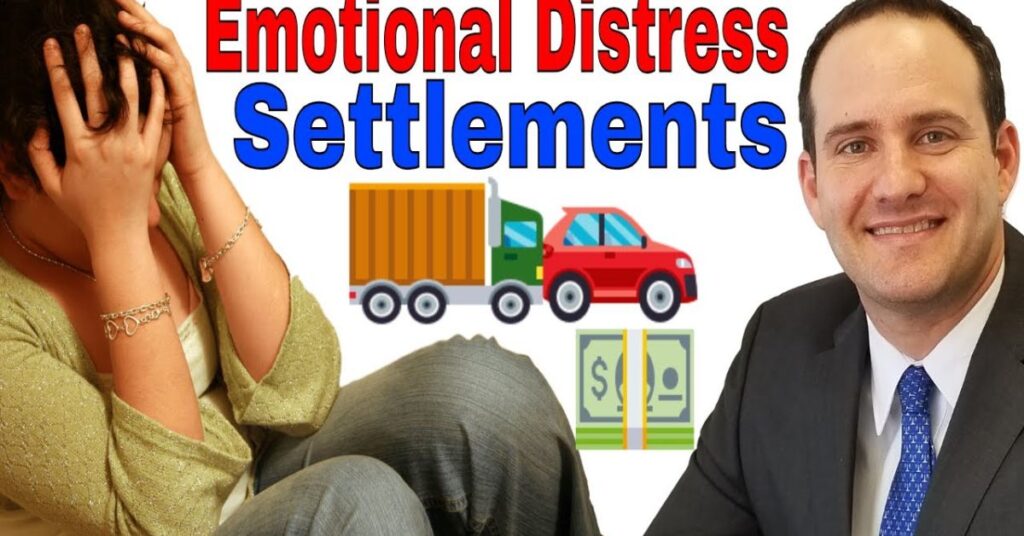Many tenants face challenging situations that can lead to emotional distress. From unresolved maintenance problems to unfair treatment, these issues can take a toll on your well-being.
Emotional distress claims against landlords can vary widely depending on factors such as the severity of the situation, local laws, and the evidence available. While it’s possible to seek compensation for emotional distress, the process can be complex.
Understanding the legal principles involved and gathering evidence to support your claim are crucial steps. So, if you’re grappling with emotional distress caused by your landlord’s actions, it’s essential to explore your legal options and seek guidance to protect your rights and well-being.
Can I sue my landlord for emotional distress?
Certainly, you can sue your landlord for emotional distress under certain circumstances. Emotional distress claims against landlords typically arise when the landlord’s actions or negligence cause severe emotional harm to the tenant. These actions may include things like harassment, invasion of privacy, failure to address safety concerns or intentional infliction of emotional distress.
To have a strong case for suing your landlord for emotional distress, you’ll need to demonstrate that their actions were extreme or outrageous and that they directly caused you significant emotional harm. It’s essential to document any incidents, gather evidence, and consider seeking legal advice to understand your rights and options.
However, emotional distress claims can be complex, and the laws governing them vary by jurisdiction. Consulting with a qualified attorney who specializes in landlord-tenant law can provide you with personalized guidance based on your specific situation and help you navigate the legal process effectively.
How much can I sue my landlord for emotional distress?
| Factors Affecting Emotional Distress Damages | Description |
| Severity of Emotional Harm | The extent to which the landlord’s actions have caused emotional suffering and mental anguish to the tenant. |
| Duration of Emotional Distress | The length of time over which the tenant has experienced emotional distress due to the landlord’s actions. |
| Physical Symptoms | Any physical manifestations or harm resulting from the emotional distress, such as insomnia, headaches, or stomach problems. |
| Impact on Daily Life | How the emotional distress has affected the tenant’s ability to function in their daily activities, work, relationships, and overall well-being. |
| Statutory Limits | Any caps or limitations on emotional distress damages imposed by local laws or statutes. |
| Evidence and Documentation | The strength and reliability of the evidence supporting the tenant’s claim, including documentation of incidents, witness statements, and medical records. |
| Legal Representation | The expertise and advocacy provided by a qualified attorney specializing in landlord-tenant law to help navigate the legal process and pursue fair compensation. |
How do I sue my landlord for emotional distress?

Suing your landlord for emotional distress involves several steps, and it’s essential to approach the process carefully. Here’s a general outline of what you can do:
Document Incidents
Keep thorough records of any incidents or interactions with your landlord that have caused emotional distress. This includes written communication, emails, letters, and notes detailing dates, times, and specifics of each incident.
Gather Evidence
Collect evidence to support your claim, such as photographs, videos, witness statements, and any relevant documentation like maintenance requests, lease agreements, or medical records if your emotional distress has caused physical symptoms.
Review Lease Agreement
Carefully review your lease agreement to understand your rights and obligations as a tenant and any provisions related to landlord responsibilities, breach of contract, or remedies for disputes.
Consult with an Attorney
Seek guidance from a qualified attorney who specializes in landlord-tenant law and has experience with emotional distress claims. They can assess the strength of your case, explain your legal options, and advise you on the best course of action.
File a Lawsuit
If you decide to proceed with legal action, your attorney can help you draft and file a lawsuit against your landlord in the appropriate court. The lawsuit should outline the details of your claim, the damages you’re seeking, and the legal basis for your complaint.
Attend Court Proceedings
Be prepared to participate in court proceedings, including hearings, depositions, and possibly a trial if the case isn’t resolved through negotiation or settlement. Your attorney will represent you and advocate for your interests throughout the legal process.
Negotiate Settlement
In some cases, your attorney may negotiate a settlement with your landlord outside of court to resolve the dispute and avoid a lengthy legal battle. This may involve reaching a financial agreement for compensation for your emotional distress or other remedies to address the underlying issues.
Follow Legal Procedures
Adhere to all legal procedures and deadlines outlined by the court, including filing required documents, attending hearings, and complying with orders or rulings issued by the judge.
Can Tenants Sue Landlords for Emotional Distress?
Yes, tenants can sue landlords for emotional distress under certain circumstances. Emotional distress claims against landlords typically arise when the landlord’s actions or negligence cause severe emotional harm to the tenant. These actions may include harassment, invasion of privacy, failure to address safety concerns or intentional infliction of emotional distress.
To have a strong case for suing a landlord for emotional distress, tenants must typically demonstrate that:
- The landlord’s actions were extreme or outrageous.
- The landlord’s actions directly caused the tenant significant emotional harm.
- The emotional distress suffered by the tenant was severe and substantial.
It’s important for tenants considering legal action for emotional distress to document any incidents, gather evidence, and seek legal advice to understand their rights and options. Emotional distress claims can be complex, and the laws governing them vary by jurisdiction.
Consulting with a qualified attorney who specializes in landlord-tenant law can provide personalized guidance based on specific circumstances and help tenants navigate the legal process effectively.
What kind of lawyer do i need to sue my landlord
| Type of Lawyer | Description | Specialties |
| Landlord-Tenant Lawyer | Specializes in disputes between landlords and tenants. Has extensive knowledge of state and local landlord-tenant laws, including regulations governing leases, rental agreements, eviction proceedings, and tenant rights. | – Landlord-tenant disputes – Lease agreements and contracts – Eviction proceedings – Rental property regulations – Tenant rights and responsibilities |
| Real Estate Lawyer | Handles legal matters related to real estate, including landlord-tenant disputes. Provides legal advice on issues such as property ownership, leases, contracts, and property rights, including disputes involving landlords and tenants. | – Property transactions and sales – Property development and zoning – Land use regulations – Property management – Landlord-tenant disputes |
| Civil Litigation Lawyer | Manages cases that go to court and has experience with legal proceedings, courtroom advocacy, and negotiation strategies. Can handle lawsuits and represent clients in various civil matters, including disputes between landlords and tenants. | – Courtroom advocacy – Legal proceedings – Negotiation strategies – Lawsuits and litigation – Alternative dispute resolution methods (mediation, arbitration) |
How much can I use my landlord for harassment?

The amount you can sue your landlord for harassment depends on various factors, including the severity of the harassment, the impact it has had on you, and the laws in your jurisdiction. Here are some key considerations:
Severity of Harassment
The extent and severity of the harassment can influence the damages you may be awarded. This includes factors such as the frequency, duration, and nature of the harassment, as well as any physical or emotional harm it has caused.
Impact on Well-being
Courts may consider the impact of the harassment on your physical and mental well-being. If the harassment has caused significant emotional distress, anxiety, or other psychological harm, you may be entitled to higher damages.
Evidence and Documentation
It’s crucial to gather evidence to support your claim, including documentation of the harassment, such as emails, letters, recordings, or witness statements. Medical records or therapy reports documenting any emotional distress can also strengthen your case.
Legal Representation
Working with a qualified attorney who specializes in landlord-tenant law or harassment claims can help you assess the strength of your case and pursue fair compensation. They can also advocate for your rights and navigate the legal process on your behalf.
Statutory Limits
Some jurisdictions may have statutory limits on the amount of damages you can recover for harassment claims. Your attorney can advise you on any applicable limits in your area.
The Elements Necessary to Satisfy an Outrageous and Intolerable Cause of Action
To satisfy an outrageous and intolerable cause of action, commonly known as “intentional infliction of emotional distress” (IIED), several elements must typically be met. These elements can vary slightly depending on jurisdiction, but generally include:
Extreme and Outrageous Conduct
The defendant’s behavior must be extreme and outrageous. This means that the conduct goes beyond what is considered acceptable in society and is so egregious that it exceeds all bounds of decency.
Intent or Recklessness
The defendant must either intend to cause emotional distress to the plaintiff or act recklessly in disregard of the high probability that emotional distress will result from their conduct.
Causation
The defendant’s extreme and outrageous conduct must directly cause severe emotional distress to the plaintiff. This means that the plaintiff’s emotional distress must be a foreseeable result of the defendant’s actions.
Severe Emotional Distress
The emotional distress suffered by the plaintiff must be severe. This typically means that the distress is so intense that no reasonable person could be expected to endure it.
It’s important to note that IIED claims can be challenging to prove, as courts often set a high bar for what constitutes extreme and outrageous conduct. Additionally, the severity of emotional distress required for a successful claim can vary by jurisdiction.
Legal Resources and Support for Tenants
Tenants facing legal issues or seeking support have various resources available to them. Here are some common legal resources and support options for tenants:
Legal Aid Organizations
Many communities have legal aid organizations that offer free or low-cost legal assistance to tenants, particularly those with low incomes. These organizations may provide advice, representation, or referrals to tenants facing landlord-tenant disputes, eviction proceedings, or other housing-related issues.
Tenant Rights Hotlines
Some areas have tenant rights hotlines staffed by legal experts who can provide information, guidance, and referrals to tenants. These hotlines are often free and can help tenants understand their rights, navigate legal processes, and address landlord-related concerns.
Local Tenant Associations
Tenant associations or advocacy groups in your area can offer support, resources, and solidarity to tenants facing common issues such as rent increases, maintenance problems, or unfair eviction practices. These groups may also organize workshops, provide educational materials, and advocate for tenant rights at the local level.
Bar Associations
Local bar associations may offer lawyer referral services or pro bono legal clinics where tenants can receive free or discounted legal advice or representation. Contact your local bar association for information on available resources and services.
Online Legal Resources
There are many online resources available to tenants, including legal websites, forums, and self-help guides that provide information on tenant rights, landlord-tenant laws, and legal procedures. While these resources can help understand basic legal concepts, they may not provide personalized advice or representation.
Community Organizations
Community-based organizations, social services agencies, and housing nonprofits may offer support and resources to tenants in need. These organizations may provide housing counseling, mediation services, financial assistance, or referrals to legal aid providers.
Government Agencies
State or local government agencies responsible for housing, consumer protection, or civil rights may offer assistance to tenants. These agencies may investigate complaints, enforce housing laws, or provide information on tenants’ rights and responsibilities.
Tenant Handbooks and Guides
Many jurisdictions publish tenant handbooks or guides that explain local landlord-tenant laws, tenants’ rights, and legal procedures. These resources are often available online or through local government offices and can be valuable references for tenants navigating housing-related issues.
Read As: How Long Do Apartment Inspections Take? Find Out Now!
Frequently asked question
Can I sue my landlord for emotional distress?
Yes, you can sue your landlord for emotional distress under certain circumstances
How much can I sue my landlord for emotional distress?
The amount varies depending on factors such as the severity of the distress, local laws, and the evidence available.
What factors influence the amount I can sue for?
Factors include the severity and duration of distress, impact on daily life, evidence, and any statutory limits.
What should I do to strengthen my case?
Document incidents, gather evidence, seek legal advice, and consider the impact on your well-being.
Should I consult with a lawyer?
Yes, consulting with a lawyer specializing in landlord-tenant law can provide personalized guidance and help you navigate the legal process effectively.
Are there any limitations on damages I can claim?
Some jurisdictions may have statutory limits on damages for emotional distress. Your lawyer can advise you on applicable limits in your area.
How do I prove emotional distress in court?
Evidence such as documentation, witness statements, and medical records can help establish emotional distress in court.
What if I can’t afford a lawyer?
You may be able to seek assistance from legal aid organizations or tenant rights hotlines that offer free or low-cost legal assistance.
Conclusion
In conclusion, the question of how much one can sue their landlord for emotional distress is complex and depends on various factors such as the severity of the distress, local laws, and available evidence. While it is possible to seek compensation for emotional distress caused by a landlord’s actions, the process can be challenging and requires careful documentation, legal guidance, and consideration of statutory limitations.
Ultimately, consulting with a qualified attorney specializing in landlord-tenant law is essential to understanding one’s rights, assessing the strength of one case, and navigating the legal process effectively. By gathering evidence, seeking support from legal resources, and advocating for their rights, tenants can take steps to address the emotional distress caused by their landlord’s actions and pursue appropriate compensation.

James, with 5 years of business experience, brings expertise to our website. His profile reflects a commitment to excellence and innovation in his field.







